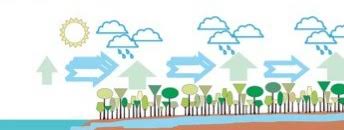 |
| Add caption |
This blog has been inspired by the postponement on a vote for a bill which would allow for the destruction and deforestation of this ecosystem. Much pressure has been pressed by the public, members of parliament and international companies. The world is now keeping an eye on this piece of legislation and hoping they place the world's well-being over short-term economical benefits.
https://climate.nasa.gov/news/2608/new-study-shows-the-amazon-makes-its-own-rainy-season/
About 20% of the Amazon has already been destroyed for grazing of livestock, growing crops for the livestock opening up Brazil to establish more urban centers away from the coast and obtaining resources ie palm oil. It is expected there will be an overall 27% removal of the rainforest within the next 10 years. The Amazon rainforest plays a vital role in the water cycle for the Amazon region and for the entire continent of South America. Hypothetically if the entire rainforest had been cleared it is likely this region would become an arid region, prone to fires and struggle to grow viable crops. The trees in this forest acts as a biotic pump which releases transpiration creating water vapor which will then cool and condense. This condensation reduces the air pressure that creates a vacuum where the evaporated water from the Atlantic ocean is pushed in the direction of the Amazon. As the vapor (clouds) drifts along the west of the continent it drops water along the continent and releases the remainder of the water droplets once it reaches the Andes mountain (relief rainfall). This relief rainfall is then collected and stored by the vegetation of the Andes with the rest entering rivers where they flow through the continent where most of the rivers flow back out to the east of South American coast where it begins this water cycle in the Atlantic ocean. A single oak tree transpires 40,000 gallons of water vapor per year so due to the intensity of the trees in the Amazon rainforest it is commonly compared as a flowing river in the sky. This rainforest creates it's own climate which will be eternally eliminated in the South American continent if the Amazon rainforest is completely cleared. 10-15% of all global atmospheric water is available due to forests. It's been predicted by Princeton University that there will be a decrease in precipitation in the Americas if deforestation continues. It's also predicted that the complete removal of the Amazon rainforest could lead to a decrease in precipitation at a magnitude of a 50% decline in rainfall as far up as the Sierra Nevada. The increase in fires created in the US and Canada seen in recent years is expected to be caused by the 20% of rain forest already destroyed.

https://www.americanforests.org/blog/no-trees-means-no-rain/
The Amazon rainforrest is also responsible for temperature regulation for the South American continent through the storage of a trillion tonnes of carbon with 31% of this carbon stored within the biomass of the trees (leaves) which would be released through an increase in deforestation. These forests also regulate the temperature within it's region as it creates clouds through transpiration. These clouds (especially white clouds) reflects the sunlight wavelength which reduces the temperature and decreases the risk of desiccation of South American soils and vegetation. This decrease in rainfall and increase in temperature (evaporation) will likely lead to the inaccessibility of drinking water and establishment of unsuitable conditions for much of the vegetation (crops). It is likely there will be growth of pioneer species (fast growing, tolerant plants) with most unsuitable for crop production and a scarcity of vegetation to sustain the population in South America.
In conclusion, if deforestation continues the soil will lose it's fertility and so if grazing of livestock is desired receding of the rain forest will need to be done which will result in desertification turning this continent into a 3rd world region with insufficient levels of crops and drinking water. Tourism is also sure to reduce as a result and fires will become a more common occurrence which will constantly destroy any remnants of their economy in South America. Although, it may benefit Brazil to open up the Amazon rain forest to profit from urban centers and agriculture, the further destruction will create devastating effects to Brazil in the long term and likely to harm nations outside of South America. I believe it is likely that this currently thriving nation may become a third world nation struggling to find water, grow crops with malnourished livestock. Their tourism which accounts for such a high amount of their economy will crumble with the only people immigrating in likely to have aid due to the harsh conditions which will ensue. Please comment below on whether you agree or disagree with all criticisms more than welcome.
